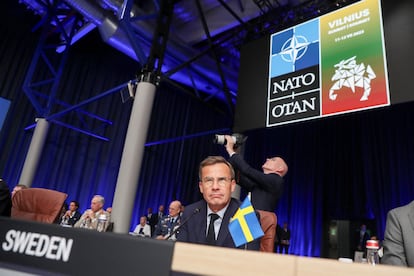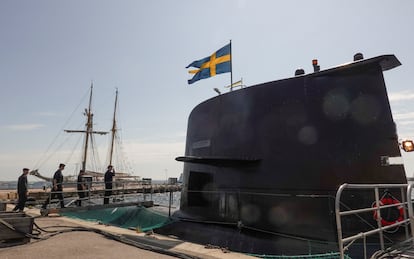How Sweden’s membership will strengthen NATO: Sophisticated subs and more control over Baltic and Arctic
The island of Gotland will become one of the strongholds of the Alliance, and the powerful Swedish military industry will strengthen the development of aircraft, tanks and anti-aircraft defense systems

After two centuries of military neutrality, and more than a year plagued by unexpected obstacles to accession, Sweden is closer than ever to becoming NATO’s 32nd member. A pledge by the president of Turkey, Recep Tayyip Erdoğan, to drop his objections to Sweden’s accession finally paves the way to the short-term transformation of northern Europe’s security framework as a result of the Russian invasion of Ukraine. The Atlantic Alliance will gain strategic depth with the addition of the new partner, significantly reinforcing NATO’s capabilities in the Arctic and, above all, in the Baltic Sea, where the island of Gotland and the powerful fleet of Swedish Navy submarines —a strategic asset of incalculable value — represent a guarantee for the defense of Poland and the Baltic countries.
Sweden is not a great military power. Stockholm adopted a policy of neutrality when the Napoleonic Wars ended in the 19th century. After the end of the Cold War, the Scandinavian country undertook a demilitarization process in which military spending was progressively and drastically reduced, and regiments were dissolved throughout the territory. In 2005 the last Swedish soldiers left Gotland; the island, considered “an unsinkable aircraft carrier” by multiple analysts, had ceased to be a strategic priority for Stockholm given the apparent disappearance of the Russian threat. Some countries bordering the Baltic Sea had implored Sweden not to demilitarize Gotland, given the risk of a potential occupation of the island in a lightning offensive by Russian troops.
Everything changed again in 2014, after the Russian annexation of the Ukrainian peninsula of Crimea and the start of fighting in the Donbas region. In the years that followed, Sweden reinstated conscription for men and women, sent a regiment back to Gotland and set up an anti-aircraft defense system on the island — which is similar in size to Mallorca in Spain or Rhodes in Greece — and also sent infantry fighting vehicles and Leopard 2 tanks. In January 2022, when more than 100,000 Russian soldiers were awaiting orders on the Ukrainian border, almost 1,000 Swedish soldiers moved to Gotland to reinforce the security of the strategic territory, and shortly thereafter the government announced it was investing 1,600 million Swedish crowns (about $154 million or €140 million) to expand the military infrastructure on the island.
When Sweden joins NATO, Gotland will become one of the strongholds of the Alliance. In 2017, during a visit, Ben Hodges, then commander of the U.S. army in Europe, stated that “there is no island in the world with greater strategic importance.” Gotland is less than 186 miles (300 kilometers) from Kaliningrad, a Russian enclave located between Poland and Lithuania that is home to the Russian Baltic Fleet. The waters of this sea are navigable all year round, and more than 1,500 ships use this seaway every day. “Whoever controls Gotland can dominate the air and sea space of the southern Baltic,” declared Magnus Frykvall, the highest authority of the Swedish Army on the island, just over a year ago.
The incorporation of Gotland into the territory of the Atlantic Alliance will also mean an obvious reinforcement for the defense of Poland and, especially, Lithuania, Latvia and Estonia, the most vulnerable allies in the event of an attack from Russia. The integration of Sweden into the military bloc will practically turn the Baltic Sea into a NATO-controlled body of water, unlike during the Cold War, when much of its coasts were in Communist hands (Soviet Union, East Germany and Poland). or neutral (Sweden and Finland).
In Brussels, the headquarters of NATO, it is not only the future incorporation of Gotland that is being celebrated. Sweden has another precious asset: its fleet of world-class conventional submarines. The Baltic Sea — sometimes called “a flooded prairie” — is very shallow (with an average depth of 57 meters or 180 ft) and the nuclear-powered vessels that make up much of the Russian and U.S. submarine fleet cannot operate in it.
Sweden, on the other hand, has been operating submarines in the Baltic Sea since 1904. No other country in the region has been as active underwater. Swedish Navy submarines can stay submerged for weeks. Most conventional — non-nuclear — underwater vessels are battery-powered and need to return to the surface after a couple of days to keep their diesel engines running. But Swedish submarines have liquid oxygen stored in tanks on board that allow the batteries to be recharged without surfacing. Sweden has three advanced Gotland class submarines and one older model that will be retired when two newly designed vessels are delivered, before 2028.

A new flank for the Alliance
In addition to the Baltic, Sweden’s future membership — together with Finland’s recent accession — will create a new flank for the Alliance in the Arctic region, in addition to those in the East and the South, the only ones it had for decades. The incorporation of the two Scandinavian countries represents a challenge for NATO at a time when Moscow has undertaken an ambitious reinforcement of its Arctic projection.
Upon accession, Sweden will become the sixth-largest NATO member. This country of just over 10 million inhabitants has some 25,000 professional soldiers and 35,000 reservists, as well as a powerful military industry that develops sophisticated combat planes, tanks and anti-aircraft defense systems.
Following Erdoğan’s commitment to stop blocking Sweden, Stockholm trusts that the Turkish Parliament will give the green light to its NATO membership as soon as possible. Ankara has not yet defined the deadlines for approval in the National Assembly, although most of the Swedish media are speculating that it will happen in September. In addition to Turkey, Hungary has also blocked Sweden for more than 10 months. But Foreign Minister Péter Szijjártó declared on Tuesday that his country’s approval is “a mere technical matter” that will not delay Swedish membership.
The approval by the parliaments in Ankara and Budapest will mark the definitive end to more than two centuries of Swedish military neutrality — or “non-alignment,” the term used by Stockholm since it joined the EU in 1995. And it will complete a process of integration into the Euro-Atlantic organization that Sweden and Finland began jointly in April of last year and whose paths diverged after Ankara and Budapest greenlighted Finland’s membership in March.
Sign up for our weekly newsletter to get more English-language news coverage from EL PAÍS USA Edition
Tu suscripción se está usando en otro dispositivo
¿Quieres añadir otro usuario a tu suscripción?
Si continúas leyendo en este dispositivo, no se podrá leer en el otro.
FlechaTu suscripción se está usando en otro dispositivo y solo puedes acceder a EL PAÍS desde un dispositivo a la vez.
Si quieres compartir tu cuenta, cambia tu suscripción a la modalidad Premium, así podrás añadir otro usuario. Cada uno accederá con su propia cuenta de email, lo que os permitirá personalizar vuestra experiencia en EL PAÍS.
¿Tienes una suscripción de empresa? Accede aquí para contratar más cuentas.
En el caso de no saber quién está usando tu cuenta, te recomendamos cambiar tu contraseña aquí.
Si decides continuar compartiendo tu cuenta, este mensaje se mostrará en tu dispositivo y en el de la otra persona que está usando tu cuenta de forma indefinida, afectando a tu experiencia de lectura. Puedes consultar aquí los términos y condiciones de la suscripción digital.









































